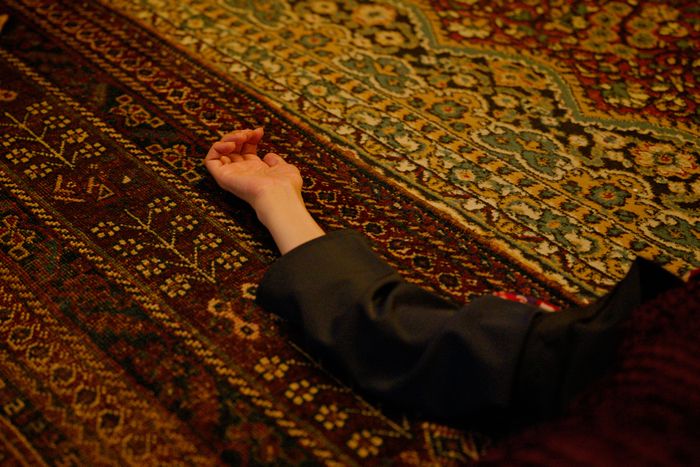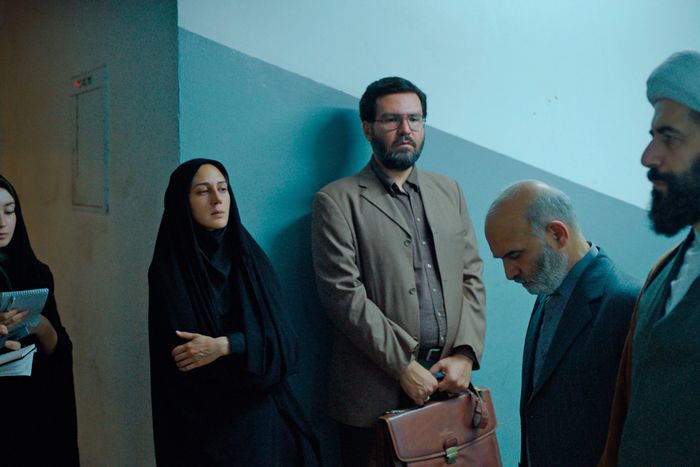
By design, Holy Spider is relentless. Director and co-writer Ali Abbasi’s film lets the prowling of its serial killer set the rhythm: A pattern emerges after the first time we see Iran-Iraq War veteran Saeed Azimi (Mehdi Bajestani) murder a sex worker in the holy city of Mashhad. The camera zooms alongside Saeed, nicknamed the Spider Killer, as he hops on his motorcycle and drives loops around the city’s central Ab Square. Composer Martin Dirkov’s score shifts into an ominous barrage of synths and sonic shards. The frame fills with the faces of these women, their hijabs pushed back and their hair exposed, their lipstick bold and dark, and their expressions somewhere between sneers and surrender. We know what will happen to them — what Saeed will do to them — and Abbasi doesn’t let us look away. Holy Spider argues that the cyclical nature of misogyny makes these kinds of crimes inevitable. That finger-pointing is at its most precise and most upsetting in the film’s final moments.
Abbasi’s film, though fictionalized, adapts many elements from director Maziar Bahari’s 2003 documentary about the case, And Along Came a Spider. That 54-minute film (available to watch on YouTube) features interviews with the real murderer, Saeed Hanaei, which inform Abbasi and Bajestani’s version of the man in Holy Spider. We also hear from journalist Roya Karimi, who covered Hanaei’s trial and speaks in the documentary about the man’s rigidity and forthrightness, and how he acted in court “as if he’d just returned from a pilgrimage.”
In real life, when Hanaei was murdering women from 2000 to 2001 and dumping their bodies in streets and fields, he was only found after his would-be-17th victim escaped and led police to his home days later, after overcoming her own fear of the authorities. Holy Spider’s fictional female journalist character, Arezoo Rahimi (Zar Amir Ebrahimi, who won Best Actress at the Cannes Film Festival for her performance) feels like a nod to Karimi and the daughter of one of Hanaei’s victims, who says in the documentary that she was inspired to be a reporter so she could battle negative assumptions about women like her mother. Arezoo becomes convinced that police officers, religious and government leaders, and the trial judge are all working together to protect the killer both before and after he is captured.
The sexism she experiences while covering the investigation and trying to track down the killer is both specific to Iran (a hotel employee refusing to rent her a room as an unmarried woman) and broadly reflective of sexism everywhere (a cop intimidating and harassing her, rumors about why she left her last job, the way society blames women for infidelity instead of men). And although Abbasi says in the film’s press notes that he doesn’t see Holy Spider as a “‘theme’ movie about certain social problems,” it is. The director also didn’t “want to let Saeed’s story and persona saturate the film,” but it does, to meaningful effect.
Holy Spider shows that Saeed was able to prey on these women thanks to the economic disparity and desperation that pushed them into drug use and sex work. We spend time with Saeed as he laments living through the Iran-Iraq War (“I came out of it without a scratch … because I wasn’t worthy”), and as he becomes obsessed with the idea that his true calling is to defend the legacy of prominent religious figure Imam Reza from the sex workers who work near his tomb. Holy Spider must simultaneously establish why Saeed finds his ideology so alluring, and why his demand for female purity is driven by a hatred of women rather than a devotion to God. Abbasi accomplishes this through those repetitive scenes of misogynist brutality.
The lies Saeed tells women to get them into his apartment, how antsy he becomes as he waits for them to let their guard down, the efficiency with which he uses their headscarves to strangle them — Abbasi sharpens the many layers of Saeed’s wrongdoing by focusing on the women’s panicked breaths and flailing limbs. Shots of body parts in isolation, like a hand curled on a rug and a foot sticking out into a doorway, emphasize how quickly Saeed moves onto imagining the next kill, and how suddenly these formerly alive women become litter to discard. There’s a telling moment when Saeed lingers over the body of his latest victim, Soghra (Ariane Naziri), smelling her hair and skin and nuzzling her neck; catching himself, he lurches off her and asks, “Forgive me, Allah.” The crime in his eyes isn’t murder, but lust: to him, losing control over his body is worse than destroying another’s. When Saeed’s daughter Khadijeh (Maryam Taleb) finds the lipstick-smeared apple that Soghra had bit into under the family’s living-room couch, Saeed tosses the withered fruit out of the window — both to get rid of evidence, and to stop the female sin he sees in this item of religious imagery from spreading to his daughter.
The Persian word fased is used throughout the film to describe sex workers, and is always translated as “corrupt” in the subtitles. But there’s a secondary definition of fased that means “rotten,” and here Saeed’s home is the source of decay, corroding all who enter. His wife Fatima (Forouzan Jamshidnejad), though distraught over how their family will survive without its breadwinner, defends Saeed to their teen son, Ali (Mesbah Taleb): “Your father took care” of “some corrupt women,” she tells him. Ali is eventually swayed by his father’s friend, the politically connected fellow veteran Haji (Firouz Agheli), and by the crowds in Mashhad who defend what his father did, laugh at his jokes in court, and call for his release.
All of it sets up the film’s closing scene, a variation of a moment from And Along Came a Spider in which Bahari interviews Hanaei’s son. In the documentary, the real Ali walks Bahari through his family home and explains with a sterile detachment how his father brought women inside and strangled them, using a floor pillow to demonstrate. Pride creeps into his tone when praising his father’s efficiency: “He had two hours to get rid of a Corruptor of the Earth … He’s a great man.” Parts of that interview sound rehearsed, like when Ali compares his father to a martyred suicide bomber and complains about officials failing to “deal with these women.” But the grin that spreads across his face when he mentions that “10 or 20 people” have told him to continue his father’s work seems genuine. “I say, ‘Let’s wait and see,’” he recounts with a little laugh, and Bahari keeps the camera tightly on Ali to capture his slight emotional deviations, from the innocence of paternal worship to the zealotry of learned resentment.
Holy Spider’s version of the teenager goes much farther. He re-enacts his father’s crimes in uncomfortable detail — encapsulating the film’s guiding message about how hatred is normalized and reified from generation to generation. This time it’s Arezoo questioning him, and Taleb traces the same route through the house and repeats much of what the real Ali said (he even replicates the boy’s sheepish grin when he says, “Let’s wait and see”). But fictional Ali does something the real Ali never did in the documentary: He asks for his younger sister Khadijeh — the same girl that his father Saeed attempted to protect from that “trash” apple left behind by Soghra — to come help him act out his father’s killings. Offscreen, Arezoo tries to stop it (“It’s OK, we get what you mean”), but Ali, emboldened by stepping into his father’s shoes and accustomed to being listened to by both women and girls, insists upon Khadijeh’s presence. In her headscarf, Khadijeh comes into the room. She knows how to play her part, laying down on the floor and remaining motionless as her brother puts his knee on her chest and his forearm on her throat, his hand tugging on her headscarf.
Even as Khadijeh says “I’m dead” through a big smile to Arezoo, the scene is bleakly ominous. All the pieces are in place not only for Ali to take up his father’s mantle, but for a young girl like Khadijeh to grow up believing that such murders are justified. When Ali calls her “a clown,” the image it conjures — a painted face, an artificial smile, a purpose tied expressly to another person’s amusement — isn’t dissimilar from the sex workers his father so loathed. If the line between goodness and badness for a woman is so thin, and taught to children at such a young age, what hope is there to avoid another Spider Killer’s rampage?
Abbasi might insist he wasn’t making a film about social issues, but that is hard to accept. Holy Spider’s final scene argues that oppression and sexism remain systemic because of their cyclical quality. That omnipresence is particularly stark in a country this strict about public morality, this unyielding in its divisions between men and women, and this destabilized by economic sanctions. An argument could be made that Holy Spider will help its viewers understand the women-led protests in Iran that began in September and continue to this day, but the film understands that chauvinism endures anywhere and at any time. Iran is at the center of the Holy Spider web, but its menacing strands, and the observations they hold, stretch far and wide.
related
- The Thriller Drop Is a Perfect Addition to the Bad-First-Date Canon
- Another Simple Favor Crew Brushes Off Lively-Baldoni Drama
- Emilia Pérez’s Controversial Camino



